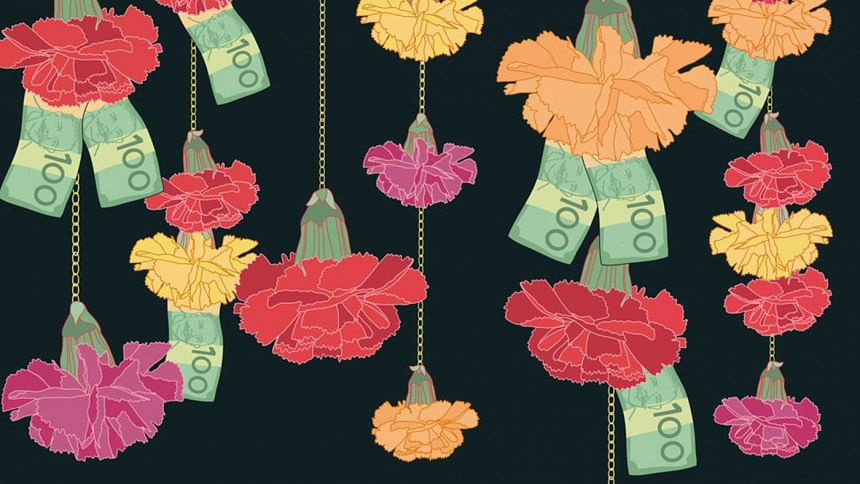The curse of dowry still haunts the poor

I was shocked to know recently that my housemaid, who is a widow, had to pay for Tk 2 lakh worth of furniture and clothing for her daughter's soon-to-be husband as dowry. When I discouraged her from making the dowry payment and informed her that it is unlawful, she replied that it is a social custom and if she refuses, her daughter will forever remain unmarried. She further added that if she does not pay, she is afraid that her daughter's husband and in-laws will not treat her well.
Different studies have shown that poor families in rural Bangladesh raise money to pay dowry by selling off their productive assets such as land, ponds, livestock, trees, and by taking loans often at high interest rates. These families are unable to buy land or other assets again. And, sometimes, when they fail to repay their loans, they enter into a phase of chronic poverty.
The underlying causes of this practice are often associated with the status of women in society, who are seen as unproductive, uneducated and helpless. To deal with this issue, the government had enacted the Dowry Prohibition Act, 2018, by repealing the Dowry Prohibition Act, 1980. However, the practice of dowry still remains prevalent in Bangladesh.
Interestingly, however, during community dialogues, most people agree that dowry is a social evil and a symptom of greed, and should be eliminated. Many have shared their personal stories during such dialogues about how dowry payments had made them poor and economically vulnerable.
It is important to mention that in the past, the dowry amounts were small and were part of the exchange of gifts between the bride and groom's families as a gesture of goodwill. But with time, as conceived by many as a consequence of inflationary pressure, the dowry demands have risen and at the same time, become more prevalent in rural communities. It is, therefore, unfortunate that society has made marriage a commercial transaction, giving more weight to money and property instead of the bride herself.
There are a number of negative consequences of dowry for poorer families. Being unable to meet their basic needs due to the loss of productive assets such as land, rickshaw or van, families are sometimes forced to withdraw their children from schools and engage them in work to bring in additional income. Besides, loss of income forces family members to reduce their food consumption and become malnourished. Due to poverty, many families decide to migrate to urban areas in search of work and start a new life in the slums. Thus, similar to natural disasters, dowry can push moderately poor families into extreme poverty.
There are potentially two types of measures required—one to stop dowry and the other to mitigate the effects of dowry on families who have become poorer because of it. The first set of measures include raising awareness in society, strict law enforcement and community mobilisation by local government bodies and NGOs. An important aspect that should be highlighted in the awareness campaign is the notion that both boys and girls are equally valuable and deserve to be treated equally.
While the attitude towards girls should change, the importance of educating girls should also be promoted. This would change the perception about girls being unproductive burdens to economically active persons. In addition, the propensity towards having expensive marriage ceremonies should change, since wedding expenses in rural areas are often borne by the bride's family.
On the flipside, families who have become poor because of dowry payments will require financial support by NGOs through micro-credit and skills training programmes, and through the government's social safety-net programmes. NGOs and ministries working directly on women's empowerment and economic upliftment should work together to improve the socio-economic status of these families.
The practice of dowry exacerbates poverty and inequality, is a source of post-marital disputes, and is a major cause of divorce in the country. Since it is a widely practised social problem, only legal measures will not be enough—social interventions are critical to end it. Many women become victims of violence every year over the payment of dowry, and thus this issue demands serious attention from the government and civil society.
Dr Nawshad Ahmed, a former UN official, is an economist and urban planner.

 For all latest news, follow The Daily Star's Google News channel.
For all latest news, follow The Daily Star's Google News channel. 



Comments